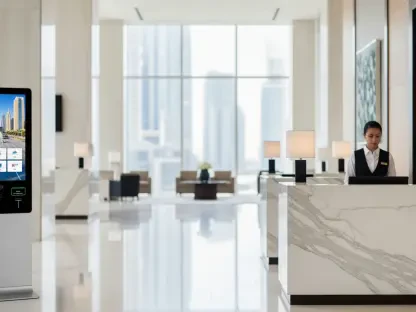The world has been fundamentally changed following the events of the pandemic—and the hospitality sector is certainly no exception. While the business world has steadily adapted to the shift in work-from-home models, hospitality organizations have flipped that notion on its head to redefine what that home could look like for traveling digital nomads.
As the burgeoning remote workforce shifts traditional paradigms, hotels across nations are following suit and evolving into dynamic centers that exceed guest expectations. The demand is so great that dream travel destinations are transforming approaches to hospitality and tourism to better support digital nomad needs.
This article will take a closer look at the new era of travel, in which people can work hard and play hard at the same time.
Hybrid Hospitality
With an estimated 35 million digital nomads across the globe, referring to workers who choose to operate remotely without a fixed business location, there is a louder call for hybrid work needs—and the hospitality industry has shown great promise in answering it. According to Colliers International, “Hybrid Hospitality” is on the horizon, promising to provide a 20% boost in turnover due to more adaptable office spaces.
More so, hotels avidly adapting to more diverse offerings empower hospitality environments to propel past being just an establishment to eat and sleep and become a venue for eager entrepreneurs to meet and collaborate—and, in turn, optimize areas of the business that may be underutilized.
Co-Working Spaces
More hotels are embracing flexible workspaces by offering dedicated co-working areas to cater to travelers blending business with leisure. These spaces offer great social resources and out-of-the-box amenities that attract new niche markets and boost revenue streams. From high internet speeds to professional meeting rooms, these multifunctional spaces foster connection by simulating natural work environments—with added comforts.
Monetize the Lobby Space
Why confine transformation to just the four walls of the new-gen office? That’s taking it a step backward. To diversify revenue, hotels can turn their lobbies into multipurpose environments for people to unwind after work and provide significant cash flow during off-leisure seasons. This presents an in-built competitive advantage. Hotels also have the added benefit of offering 24/7 services, unlike their more conventional counterparts.
Rolling Out the Red Carpet for Remote Workers
Following in the future-forward footsteps of hoteliers, entire countries are revamping their approaches to hospitality.
Bali, Indonesia
Bali, a beautiful and bountiful island nestled in Indonesia’s archipelago, boasting picturesque beaches and culturally rich experiences, is a traveler’s dream. While every location deserves its own postcard, Bali’s allure injects rejuvenation directly into the work experience and stretches far beyond its scenic treasures. Remote workers are drawn to this island’s unique mix of professionalism and relaxation, which enables them to absorb inspiration from the vibrancy around them.
Bali has undergone significant infrastructural transformations to support growing remote worker demands, such as speedy internet connections—every digital nomad’s number one priority. In response, internet service providers are boosting digital infrastructure across the island to ensure more robust connectivity—even in less-developed locations. On the ground, Bali has also upgraded to more sustainable transport systems and roads to make island navigation more accessible for visitors.
Notably, Bali hosts established co-working hubs that provide office spaces, private meeting rooms, and community areas—with a tropical twist.
Companies like Outpost, located in Canggu and Ubud, offer both virtual and in-person offices for both short-term and long-term needs. Coupled with the serenity of these work environments, Outpost also provides valuable social resources through an array of community events. From beachside hands-on workshops to sunset networking events, such businesses are taking the woe out of work—and only a seven-minute walk away from the Ubud Monkey Forest.
Dubai, United Arab Emirates
When you think of Dubai, images of grandeur and luxury probably spring to mind. Located in the Persian Gulf of the United Arab Emirates, this city is world-renowned for its soaring skyscrapers and roaring nightlife.
Today, Dubai embarks on a revolutionary journey into the revels of remote work by partnering with Airbnb to bring new meaning to work-from-home. This renewed focus results from the UAE’s goal to skyrocket tourism’s contribution to the national gross domestic product to $122 billion annually over the next six years.
As part of this objective, the UAE has introduced a variety of residency visas targeted at remote workers—inviting digital nomads to immerse themselves in the exhilaration of the city for longer periods. By swinging the door wide open for opportunities to flood through, the different types of UAE Residency Visa offer a sense of stability and growth for traveling workers.
Virtual Work Residence Visa
The virtual work residence visa was introduced in 2022 as a way for those employed by companies outside the UAE to reside and work remotely from within its borders for up to one year—subject to renewal. To apply, individuals must produce a valid passport, proof of employment with said company, and proof of income. These workers must earn a monthly salary of $3,500 or equivalent in other currencies.
Dubai Green Visa
With the vision of establishing the city as a melting pot for innovation, creativity, and entrepreneurship, the Dubai Green Visa serves as a flexible and renewable residency path intentionally designed for freelancers and self-employed or skilled individuals. To be eligible as a freelancer, you must earn a monthly income of at least $ 98,000, provide proof of a specialized diploma or bachelor’s degree, and secure a freelance permit from the Ministry of Human Resources and Emiratisation.
Final Thoughts
These developments of hybrid hospitality are paving the way for the future of both work and travel—by meeting at a crossroads and establishing an ecosystem where digital nomads can thrive. Dream locations like Bali are embracing the remote work lifestyle with open arms and proving that work can happen anywhere—whether that be a bustling metropolis or a meandering beach.
The hospitality industry isn’t merely adapting to this transformation, but molding itself along with it and expanding its horizons for a new brand of traveler. Going far beyond just being a trend, this sector is re-envisioning how people live, work, and grow in a balanced and productive way. What’s more, hospitality enterprises across the globe are stepping into a world where the warmth of the past meets the efficiency of the future.
So, ask yourself: Are you ready to step out of the comfort of your cubicle and blur the boundaries of the work-life balance?









